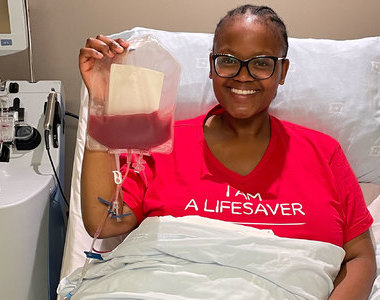Pay it forward: EMS launches young adults coding course
31 July 2023 | Story Helen Swingler. Photos Lerato Maduna. Voice Cwenga Koyana. Read time 9 min.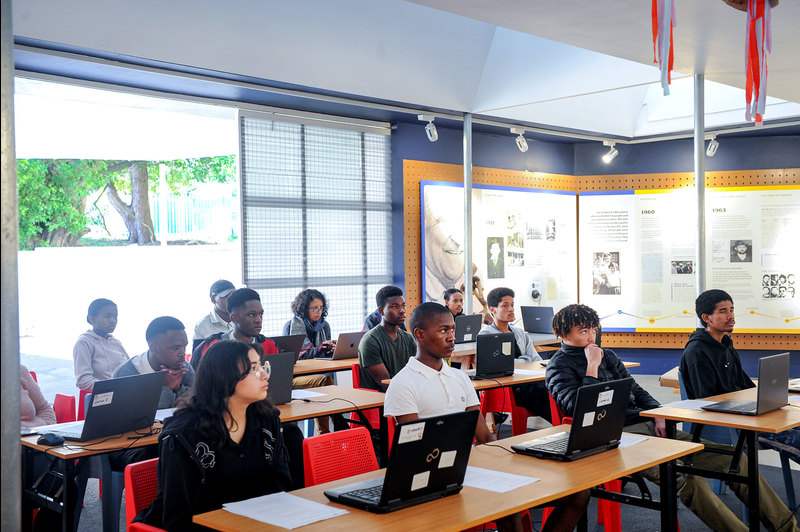
“It’s that moment you see on their faces; when you realise, okay, this is making sense now. And it’s so worth it.” That’s University of Cape Town (UCT) computer science honours graduate Zahra Mohamed describing the reaction of a group of young adults the first time she introduced them to coding.
The venue was the Dennis Goldberg House of Hope (DGHoH) in Hout Bay and the group was made up of Grade 11 and 12 learners from the different communities of Hout Bay. The DGHoH is a community arts and culture centre and realises the dream of the late anti-apartheid icon Denis Goldberg. Goldberg was sentenced to life imprisonment with Nelson Mandela and six others in 1964.
UCT’s Centre for Extra Mural Studies (EMS) had commissioned Mohamed, an experienced tutor and current Allan Gray Orbis Foundation Fellow, to design two introductory coding courses. These target senior high school learners as well as school leavers and unemployed young adults, providing a leg up in a national environment of rising youth unemployment.
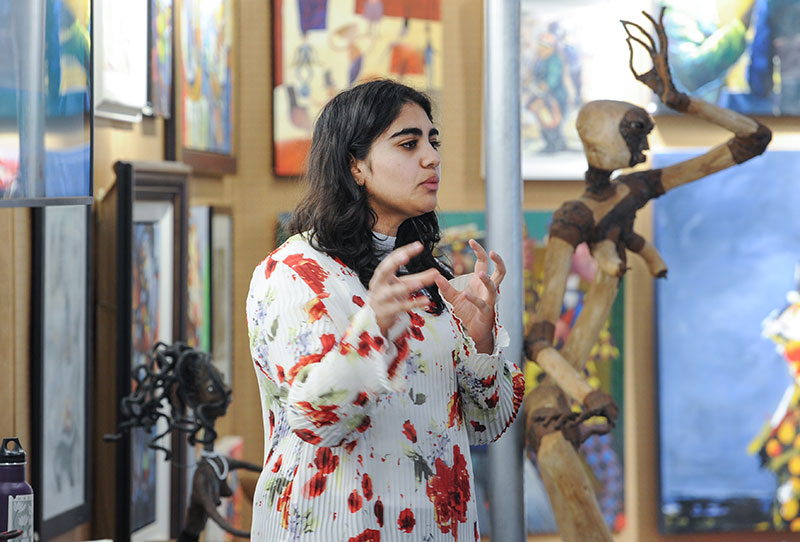
Speaking with UCT News two days into the five-day DGHoH programme in July, Mohamed said, “The students were initially very excited as they all tend to be involved in gaming. But they were also interested to know how to apply coding to real-world situations, which is why I brought those into my lessons as I went. You can’t immediately start coding games. The theoretical side is an important foundation”.
That magic happened as soon as Mohamed got them in front of the centre’s computers where they could see the results of what they’d been learning.
“With coding, a lot happens in the background; you’re storing information; you can’t see that information because it’s inside the computer. And that can be challenging for the students. But they’re doing well. I’m quite proud of them.”
Each received a certificate of completion at the end of the week.
The feedback from students in their evaluation remarks has been highly complimentary.
In response to the question, “How did you find the lectures you attended?”, one learner said, “At first nervous, (not knowing what coding is), but I enjoyed every lesson”.
Another noted, “Zarah, she’s a good teacher and she makes sure you understand what she’s teaching. She is the best!”
A third wrote, “The lectures I attended were very educational. I gained a lot of knowledge, and our mentor made it easy for us to understand. Moreover, I also gained a skill and [know] how to use a laptop”.
Another commented on their lightbulb moment, “I learnt that when you want to communicate with your computer, you can’t use human languages and that we use specific languages like Python, Java, etc, to communicate with our computers”.
The course was presented again the following week at the UCT Students’ Health and Welfare Centres Organisation (SHAWCO) Khayelitsha K1 Community Centre. This was an older group of school-leavers but it elicited similar praise in the evaluation. It will be presented again at the Philippi Hub during the September holiday.
One attendee said, “I think the lecture impressed me because the lecturer is so flexible and versatile, and she has an ability to accommodate someone who’s never been in this field”.
Another commented, “I learnt that it is ok not to understand everything but as long as you will ask for assistance where you feel it was hard”.
A third student wrote, “It started to make sense on how things like robots can be able to function on their own”.
On the sessions/topics they enjoyed most, another reflected their eagerness to know more: “I would like to learn even more on the course. It looks like there is so much to learn, and [it is] so interesting. Even the opportunities seem to be many”.
Skills development
The coding course is part of EMS’s outreach programme and builds on the transformational aspect of their work: life-long learning for all. That starts at a young age with made-to-fit courses, said EMS director, Dr Medeé Rall.
“My thinking was to give practical skills to the learners we work with.”
“We wanted to do something practical,” said Dr Rall. “My thinking was to give practical skills to the learners we work with.”
Vital sponsorship for the courses has been provided by Coca-Cola Peninsula Beverages.
The initiative is run by EMS lecturer Dr Zuleiga Adams, who worked closely with Mohamed during the design phase; two courses of different duration for different audiences and circumstances.
Dr Adams is upbeat about the impact of this kind of practical training.
“If you learn coding, it can open doors to learning the other more complex side of computer science.”
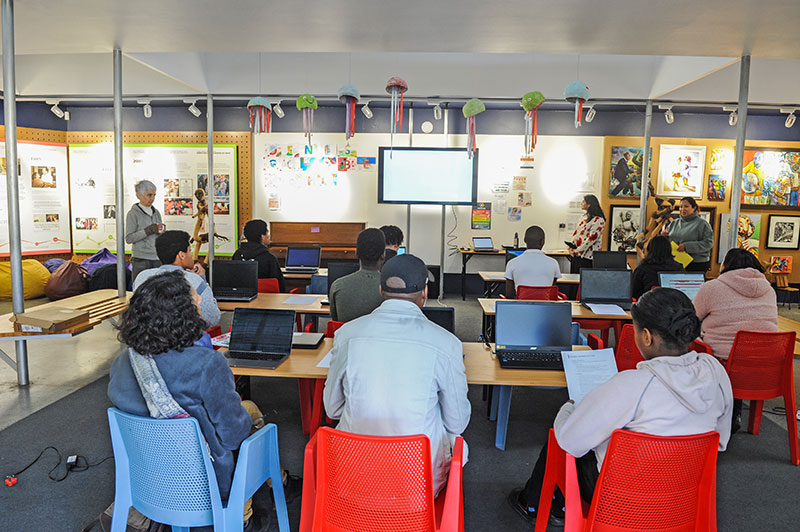
The longer course (presented at the DGHoH) offers a week of five daily two-hour classes. The shorter course of two four-hour sessions is designed to be presented on consecutive Saturdays and is pitched at Grade 10 learners but attendees at the recent DGHoH session included their staff members and some school-leavers.
The short course is taught in two sections.
The first includes an introduction to programming and to programming languages such as Python; understanding variables, values and types; building an algorithm; debugging; and an introduction to commonly used functions such as input and output functions, and String functions.
The second part includes an introduction to lists as a data structure; creating functions; importing packages and creating graphical user interfaces.
Each section has practical tasks, such as building a chatbot. This was particularly popular with the students, said Mohamed. This course will be launched to UCT’s 100UP groups in August and September and to Ikamva Youth participants in October.
Run by UCT’s Schools Development Unit, the holistic 100UP programme grooms academically strong learners from Cape Town’s three largest and most resource-poor communities for university. Ikamva Youth’s mission is to “enable disadvantaged youth to pull themselves and each other out of poverty and into tertiary education or employment”.
Learning a new language
Mohamed was an ideal choice as programme designer and presenter. With an honours degree in computer science (and plans to enrol for a master’s degree) she is a sought-after maths tutor with solid experience teaching high school learners and young adults.
“I really enjoy helping students think through these more complicated, logistical subjects. I really enjoy seeing students get it.”
“In almost every career there’s going to be an element of coding.”
Mohamed is passionate about her tutoring and mentoring work.
“In almost every career there’s going to be an element of coding,” she said. “But there’s a lot to unpack. Coding is like learning a new language ... A lot of coding borrows concepts from maths and English, but the definitions are different. Even variables in coding are very different to the variables in maths. That can be quite challenging.”
This is where the smaller classes work best, huddled around computer screens.
“I like to be able to go around the class and make sure everyone is on the same page.”
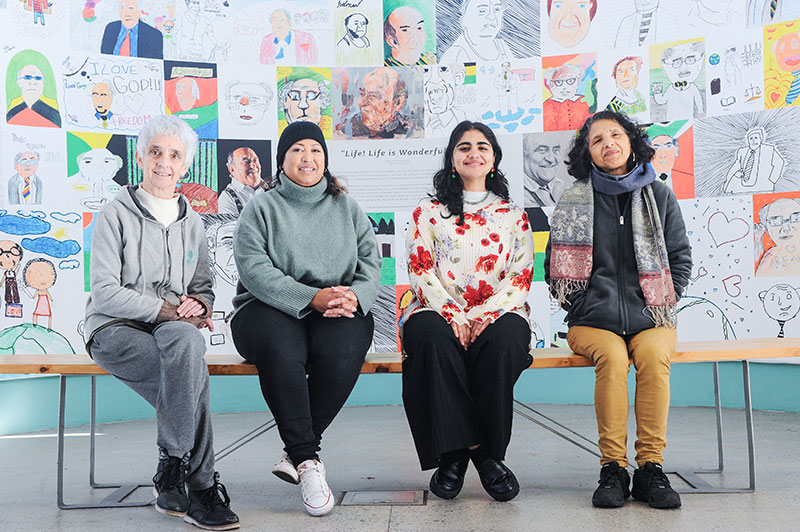
Opening doors
As a matric student and head girl at Rustenburg Girls’ High School Mohamed had her eye on a degree in astrophysics. But she took computer science as an eighth subject at school, which is where her coding journey began.
“It really clicked, and then in university I wanted to do it as a major, along with physics, which is where my real passion lay.”
But her aptitude leaned towards coding.
“I was really good at being able to solve problems that way, so I wanted to combine the two sides of my brain.”
Gift of teaching
Mohamed comes from a family of teachers; her mother and grandmother both taught. In between her studies, Mohamed has also used her skills to teach others. Besides her maths tutoring, she has been teaching computer literacy at community level.
“That gave me some tools to navigate the experience of designing a coding course. Something I learnt from my mom is the reward of knowing that you gave someone something they will always be able to use, especially coding where they can make a career of it.”
Mohamed’s role as a coding teacher has taken on an additional dimension.
“By just being able to talk to the students, I was able to teach them more than coding. Things like how to apply to university; different funding options.
“I have a passion for growth in this country. And I really do believe that getting our young people up to standard in terms of technology and coding is so important.”
 This work is licensed under a Creative Commons Attribution-NoDerivatives 4.0 International License.
This work is licensed under a Creative Commons Attribution-NoDerivatives 4.0 International License.
Please view the republishing articles page for more information.
Listen to the news
The stories in this selection include an audio recording for your listening convenience.




























































































